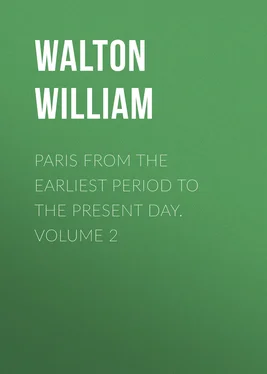William Walton - Paris from the Earliest Period to the Present Day. Volume 2
Здесь есть возможность читать онлайн «William Walton - Paris from the Earliest Period to the Present Day. Volume 2» — ознакомительный отрывок электронной книги совершенно бесплатно, а после прочтения отрывка купить полную версию. В некоторых случаях можно слушать аудио, скачать через торрент в формате fb2 и присутствует краткое содержание. Жанр: Путешествия и география, История, foreign_edu, foreign_antique, foreign_prose, на английском языке. Описание произведения, (предисловие) а так же отзывы посетителей доступны на портале библиотеки ЛибКат.
- Название:Paris from the Earliest Period to the Present Day. Volume 2
- Автор:
- Жанр:
- Год:неизвестен
- ISBN:нет данных
- Рейтинг книги:3 / 5. Голосов: 1
-
Избранное:Добавить в избранное
- Отзывы:
-
Ваша оценка:
- 60
- 1
- 2
- 3
- 4
- 5
Paris from the Earliest Period to the Present Day. Volume 2: краткое содержание, описание и аннотация
Предлагаем к чтению аннотацию, описание, краткое содержание или предисловие (зависит от того, что написал сам автор книги «Paris from the Earliest Period to the Present Day. Volume 2»). Если вы не нашли необходимую информацию о книге — напишите в комментариях, мы постараемся отыскать её.
Paris from the Earliest Period to the Present Day. Volume 2 — читать онлайн ознакомительный отрывок
Ниже представлен текст книги, разбитый по страницам. Система сохранения места последней прочитанной страницы, позволяет с удобством читать онлайн бесплатно книгу «Paris from the Earliest Period to the Present Day. Volume 2», без необходимости каждый раз заново искать на чём Вы остановились. Поставьте закладку, и сможете в любой момент перейти на страницу, на которой закончили чтение.
Интервал:
Закладка:
The king, who was then at L'Ecluse, a town in Holland, with his barons, preparing to pass over into England, returned to Paris when he heard of the decree of the Parlement, followed by his uncles, the Ducs de Berry, de Bourgogne, and de Bourbon, and a number of other seigneurs who had also "a great desire" to witness this judicial duel. The lists were arranged in the Place Sainte-Catherine, behind the Temple, on the 29th of December, 1386; the king and all his court were present, seated in galleries, and a great crowd of people thronged all the available surroundings. The two adversaries were armed from head to foot; Carrouges approached his wife, arrayed in deep mourning and seated in a chair draped in black.
"Lady," he said to her, "upon your assertion I am about to adventure my life and combat Jacques Le Gris. You know whether my quarrel is just and loyal."
"Monseigneur," she replied, "it is so, and you combat safely, for the quarrel is righteous."
"In the name of God, so be it!" replied the knight.
Then, embracing her, he took her hand, crossed himself, and entered the lists, while the lady remained kneeling in her black chair, praying fervently.
The two men took their oaths, one, of the truth of his accusation, the other, of his innocence; then they proceeded to their places at the extremities of the lists and waited for the signal; when it was given, they advanced toward each other, walking their horses, and attacked with their swords. Carrouges was the first to be wounded, seriously in the thigh, and he lost so much blood that the spectators feared for him; however, rallying all his forces, he assailed his enemy so vigorously that he succeeded in seizing him by his helmet and throwing him to the ground. Dismounting in his turn and maintaining his advantage, he endeavored to make Le Gris confess his guilt in the prospect of certain death; the latter maintained his innocence, but as he was vanquished he was adjudged culpable, and Carrouges thrust his sword through his body. Then, turning toward the spectators, he demanded of them if he had loyally done his duty. "Yes," they replied. After which he knelt before the king, who caused him to be raised, and gave him a post in the royal chamber with an annual allowance of two hundred livres. Carrouges thanked the monarch, then turned toward his wife, kissed her, and they both proceeded to Notre-Dame, where they made their offerings and returned to their hotel. The body of Le Gris was delivered to the public executioner, who dragged it on a hurdle to the gibbet of Montfaucon, where it was hung in chains.
A decree of the Parlement subsequently granted to Carrouges the sum of six thousand livres, to be taken from the property of Le Gris. But, some time later, a criminal, condemned to death for other offences, confessed that he was guilty of the outrage on the Dame de Carrouges, having assumed the name of Le Gris and profited by a certain resemblance which he bore to that unhappy gentleman. The lady, filled with remorse, sought refuge in a convent after the death of her husband, and took the vows of perpetual chastity.
Under Charles VII, in 1443, took place the first division of the authority of the Parlement, which, however, had been long preparing. The preceding year, the king had made an expedition into Gascogne and Languedoc; on his retiral he left behind him "that which was worth more than an army," a parlement established in Toulouse with jurisdiction over all of Languedoc and the duchy of Guyenne. Ten years later, the dauphin created in his appanage the Parlement of Grenoble. The double jurisdiction of the Parlement of Paris at this period is thus defined: "First, it sat in judgment on causes spéciales , those of the peers of France and of the royal domain, those of régale (right possessed by the crown to receive the income of a vacant bishopric), and those of individuals who had received by letters of committimus the right to be judged by it; second, it received appeals from all the inferior jurisdictions, the royal, seigneurial, ecclesiastic, and university tribunals. In addition, it deliberated on a multitude of administrative matters, and, under pretext of interpreting the ordinances, rendered decrees which were veritable acts of legislation. The royal ordinances having the validity of laws only when enregistered by the Parlement, it frequently refused this enregistrement , and sometimes thus checked the royal authority. Finally, it frequently exercised the right of making remontrances , not only against the ordinary ordinances, but against treaties with foreign powers, particularly concerning the papal bulls, which led to its exercising a superior superintendence over the entire government of the Church in France. These divers powers gave the Parlement of Paris a very high position in the State, and it will be frequently seen intervening in public affairs."
Under Louis XI, there were parlements at Grenoble, Bordeaux, and Dijon; greater freedom of appeal from the decisions of the seigneurial tribunals to the court of the king, and the magistrates were relieved from the fear of removal from office. We have already seen instances of the affability of this monarch toward the bourgeoisie of Paris, and his not unsuccessful attempts to identify himself with them; the tangible benefits which he bestowed upon them were quite sufficient to win their gratitude. Their offices were rendered immovable, they were exempted from all taxation, their assemblies were authorized, the free election of their magistrates, their city was carefully fortified, they were armed to the number of sixty or eighty thousand men; he permitted them to acquire, by purchase, the right which the nobles had to command the guet , and to the noblesse was given the exercise of certain municipal offices.
The États Généraux of 1484, during the minority of Charles VIII, are considered to have been the first of the truly representative national assemblies, even the peasants in the most distant communes being represented. The number of problems presented by the exigencies of the government was formidable; during the royal session, Jean de Rely, canon and deputy of Paris, addressed the monarch in an eloquent discourse, half Latin and half French, bristling with texts and citations, then he commenced to read the list of grievances demanding redress; he read bravely for three hours, when it was perceived that the young king was sound asleep, and the sitting was adjourned for two days. Neither François I nor his son Henri II had any desire to appear before the assembled representatives of the nation; the former replaced the États Généraux by a mixed assembly of notables and deputies of Bourgogne in 1526, and in the following year by an assembly of notables at Paris, which sanctioned his violation of the treaty of Madrid, and granted him two millions of golden écus for the ransom of his sons, left as hostages behind him, but it took no part in the affairs of State. The Parlement was not treated with any more consideration; a royal edict of 1523 divested the jurisdiction of the prévôt and of the Châtelet of Paris of all causes and matters of which it took cognizance in its quality as conservator of the privileges of the University, and for the judgment of these causes established a new bailiwick, of which the seat was to be the Hôtel de Nesle, where there were appointed a bailiff, a lieutenant, an avocat, a procureur du roi, twelve counsellors, an audiencer [usher, or crier], a sous-audiencer, and twelve sergents. The Parlement was much displeased at this diminution of its authority, and on the 9th of March a formidable protest against the new edict was made before it by the prévôt of Paris, his lieutenants, civil and criminal, the counsellors of the Châtelet, and all the other officers, sergents, greffiers, huissiers, and officials of the University. When the king heard of this demonstration, he sent to the Parlement the Sieur de la Barre, gentleman of his chamber, to inform that body, once for all, that when he granted letters patent it was understood that they were to be enregistered, no matter what protests might be made against them. The Parlement replied by appointing a commission to inquire concerning the necessity of establishing a new bailiwick, and sent word to the monarch that the members would inform themselves on the subject; on the 17th, the Comte Saint-Paul appeared before them with an order directing the immediate registering of the edict, and with the information that he would assist at their deliberations in order to be able to inform his royal master concerning those of them who permitted themselves to differ from him in opinion. The decree was accordingly enregistered, and on the 30th of April the Chevalier Jean de la Barre presented himself before the Parlement with the title and quality of Bailli de Paris. This office, however, was suppressed in May, 1526, and its jurisdiction reunited to that of the prévôt and of the Châtelet. In 1527, the Parlement was forbidden to interfere in any matters of State, or in anything excepting what concerned the administration of justice; it was permitted only to give advice regarding the perfecting of the laws. The two most important legal monuments of this reign were the edict of Crémieu, 1536, restricting the jurisdiction of the seigneurs, and that of Villers-Cotterets, 1539, designed to put an end to the encroachments of the tribunals of the bishops upon those of the king, and restricting their competence to spiritual or ecclesiastical causes only. Of the principal offices of the crown, four were held by men of legal lore, hommes de robe longue ,—that of grand chancellor, who held the royal seal and without whose advice nothing important could be decided; that of the secretaries of State; that of the presidents, counsellors, avocats, and all those to whom the administration of civil and criminal justice was confided throughout the realm, and that of the treasurers, precepteurs and receivers who administered the royal revenues. The superior officers of justice and finance enjoyed privileges of nobility which, while still confining them to their rank in society, exempted them from various imposts and charges.
Читать дальшеИнтервал:
Закладка:
Похожие книги на «Paris from the Earliest Period to the Present Day. Volume 2»
Представляем Вашему вниманию похожие книги на «Paris from the Earliest Period to the Present Day. Volume 2» списком для выбора. Мы отобрали схожую по названию и смыслу литературу в надежде предоставить читателям больше вариантов отыскать новые, интересные, ещё непрочитанные произведения.
Обсуждение, отзывы о книге «Paris from the Earliest Period to the Present Day. Volume 2» и просто собственные мнения читателей. Оставьте ваши комментарии, напишите, что Вы думаете о произведении, его смысле или главных героях. Укажите что конкретно понравилось, а что нет, и почему Вы так считаете.












